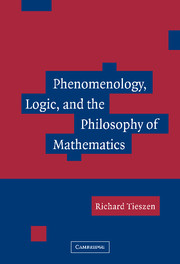Book contents
- Frontmatter
- Contents
- Acknowledgments
- Introduction: Themes and Issues
- PART I REASON, SCIENCE, AND MATHEMATICS
- PART II KURT GÖDEL, PHENOMENOLOGY, AND THE PHILOSOPHY OF MATHEMATICS
- PART III CONSTRUCTIVISM, FULFILLABLE INTENTIONS, AND ORIGINS
- 11 Intuitionism, Meaning Theory, and Cognition
- 12 The Philosophical Background of Weyl's Mathematical Constructivism
- 13 Proofs and Fulfillable Mathematical Intentions
- 14 Logicism, Impredicativity, Formalism: Some Remarks on Poincaré and Husserl
- 15 The Philosophy of Arithmetic: Frege and Husserl
- Bibliography
- Index
11 - Intuitionism, Meaning Theory, and Cognition
Published online by Cambridge University Press: 14 July 2009
- Frontmatter
- Contents
- Acknowledgments
- Introduction: Themes and Issues
- PART I REASON, SCIENCE, AND MATHEMATICS
- PART II KURT GÖDEL, PHENOMENOLOGY, AND THE PHILOSOPHY OF MATHEMATICS
- PART III CONSTRUCTIVISM, FULFILLABLE INTENTIONS, AND ORIGINS
- 11 Intuitionism, Meaning Theory, and Cognition
- 12 The Philosophical Background of Weyl's Mathematical Constructivism
- 13 Proofs and Fulfillable Mathematical Intentions
- 14 Logicism, Impredicativity, Formalism: Some Remarks on Poincaré and Husserl
- 15 The Philosophy of Arithmetic: Frege and Husserl
- Bibliography
- Index
Summary
Introduction
In intuitionism there is a fertile confluence of ideas on mathematics, meaning theory, and cognition. Philosophers interested in any one of these latter areas of research would profit from studying intuitionism. In this chapter I want to focus on several connections between intuitionism and some recent, post-Wittgensteinian views in the philosophy of mind, meaning, and language. The views I shall focus on are associated with the claim that human cognition exhibits intentionality and with related ideas in philosophical psychology. This tradition in the philosophy of mind, meaning, and language differs significantly from the tradition in which Michael Dummett has interpreted and expounded upon intuitionism. Dummett has said that he is not attempting to portray accurately the views of Brouwer and Heyting, and more than one commentator has noted that Dummett's view of intuitionism diverges widely in some respects from ‘traditional’ intuitionism. The manner in which it diverges seems to be primarily in its view of human cognition and, specifically, in its view of the key intuitionistic idea that mathematical constructions are mental processes or objects. Dummett has been influenced by Wittgensteinian views on language, meaning, and cognition, whereas I shall be arguing against the application of some of these views to intuitionism and pointing to some shortcomings in Dummett's approach. I do not claim to have the final word on what intuitionistic mental constructions are, but I think I arrive at a view on this matter that is closer than Dummett's to the common intentions of Brouwer and Heyting.
- Type
- Chapter
- Information
- Phenomenology, Logic, and the Philosophy of Mathematics , pp. 227 - 247Publisher: Cambridge University PressPrint publication year: 2005
- 1
- Cited by



